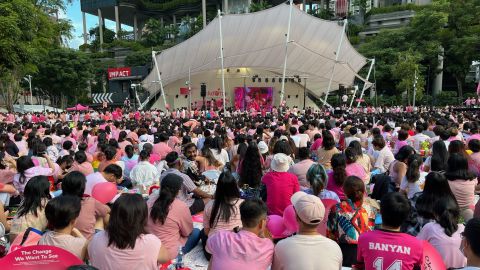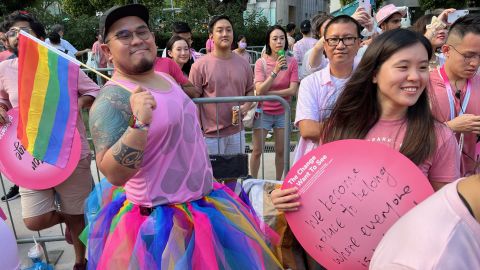Singapore
CNN
—
In a sea of thousands decked out in rainbow and pink, Dawn Lim, a full-time officer doing mandatory military service in the Singapore army, was not as flamboyantly dressed as many of her fellow attendees at the city state’s Pink Dot pride parade – but she was just as happy and proud as everyone else to be there.
Lim, 21, was born male and now identifies as trans feminine. This year’s rally was her first, and she attended it by herself.
“Transitioning in the army is as you can imagine,” she said. “I can’t publicly embrace this side of myself and only have friends in the online community.”
“But today I decided to show up for myself and had no idea what to expect. I brought along a skirt and changed into it when I arrived at the park and was so warmly welcomed. I’m enjoying everyone’s presence.”
After two years of virtual rallies due to the pandemic, Singapore’s biggest queer pride event returned on Saturday to Hong Lim Park, where it first started on May 16, 2009.
Crowds of thousands showed up on the hot and humid afternoon, carrying pink signboards and waving rainbow flags in support of the city state’s queer rights movement.

Among the crowd were the members of parliament Henry Kwek, from the ruling People’s Action Party, and Jamus Lim from the opposition Workers’ Party.
Gay sex in Singapore remains illegal even if it is consensual, between adults, and takes place in private. But societal attitudes, while still largely conservative, are changing, activists say and the government is now “considering the best way forward” on whether to change the law, which has been in place since Singapore was a British colony more than 60 years ago.
“Policies need to evolve to keep abreast of such changes in views. And legislation needs to evolve to support updated policies,” said Singaporean law and home affairs minister K Shanmugam in a recent parliament session.
“And if and when we decide to move, we will do so in a way that continues to balance between these different viewpoints, and avoids causing a sudden, destabilising change in social norms and public expectations.”
Last week, the Disney Pixar film Lightyear was given an NC16 rating in Singapore, prohibiting children under the age of 16 from watching the movie in cinemas because of a controversial scene depicting a same-sex relationship.
Singapore’s Infocomm Media Development Authority said that the animated film was inappropriate for young viewers due to “overt homosexual depictions”.
“We don’t have respect and equality, no matter what our pledge and the government says – and that’s why it’s important to stage Pink Dot every year,” said Nizam Razak, a 36-year-old gay man at Pink Dot. “Why can’t our children see a lesbian kiss? Already as it as, we are being erased in society here in so many aspects and this isn’t okay.”
“When will things really get better for us in the gay community? It’s hard to say.”

Organizers said the turnout was larger than previous years and they hoped to keep the momentum going for next year.
“The planning was a little rushed but at the end of the day, we made it. We brought thousands together in support of our cause for queer rights and pride in Singapore and that was the goal,” a representative said.
For first time attendees like Dawn Lim, the Pink Dot experience “didn’t feel like being in Singapore”. “This park, this sea of pink – it really was a safe space and I’m glad I got to experience what it’s like,” Lim said.
“For one day a year, I get to feel human and free to be myself without fear or judgment from people and when I leave Hong Lim Park tonight, I’ll just go home, and go back to my hidden life.”

